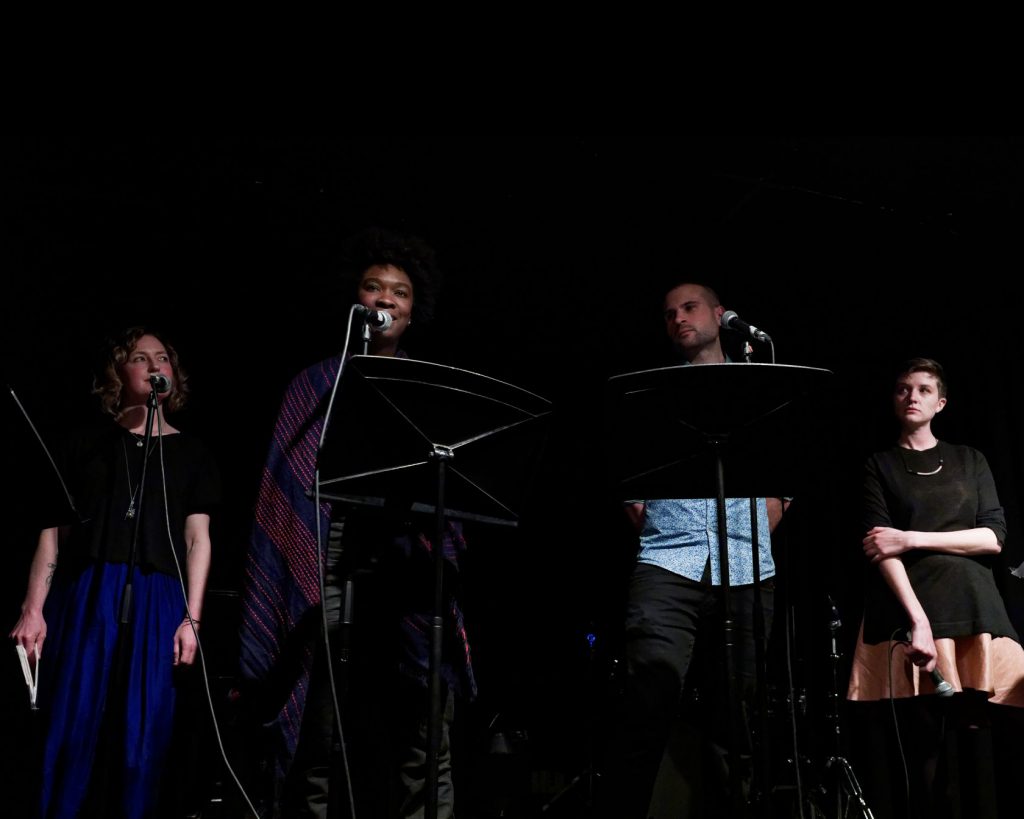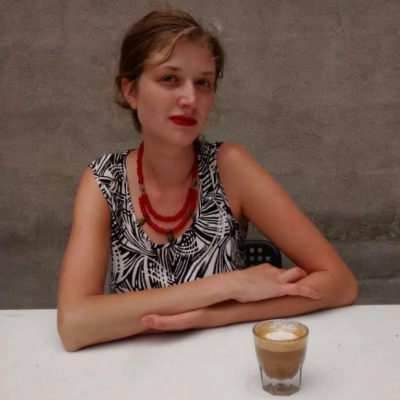
First of all, we no longer write in black
but in white
stones (Klara du Plessis)Even solidity mineral stone in hand (Aaron Boothby)
my mother bade me
not bring any more stones home (Erin Robinsong)Let me see you
leave with your
posture of stones (Canisia Lubrin)
Four weighted excerpts. Adjacent and entangled. Four poets on stage, standing at their mics. In dialogue with one another through their verse. Listening. Short snippets and complete poems. A script of contemporary poetry. A reading.
So begins the Deep Curation Poetry Reading of Saturday, 24 November 2018, at the Mile End Poets’ Festival, in Montreal’s Café Resonance, curated by myself with the support of Concordia University’s SpokenWeb research initiative, and including readings by poets Canisia Lubrin, Erin Robinsong, Aaron Boothby, and again myself, Klara du Plessis. With an audience of almost one hundred guests, this experimental poetry event was, by all accounts, a huge success.
*
The idea to curate more experimental or more conceptually navigated poetry readings had been percolating for many years before I actually organized a trial event at Toronto’s Knife Fork Book bookstore on 24 August 2018. Before, I had been curating the monthly, Montreal-based Resonance Reading Series for almost six years, following the more traditional format of inviting four to six authors for a time slot of 10-15 minutes each. What each writer decided to read within that time frame was their decision. Although I advised them to consider their audience and to steer clear of gratuitously traumatizing content, I maintained negligible curatorial agency as to the unfolding of any given night. Due to the frequency of the events and the reality of schedule changes and last-minute replacements, even considering the relevance and compatibility of certain authors sharing a stage over the course of the night was more often than not unfeasible. (It is, of course, wonderful how non-premeditated connections form and literary conversations unconsciously develop when any writers read side-by-side.)
While curatorial control is both impossible and passive, the goal of heightened curatorial agency in a Deep Curation event allows for poetry readings that are coherent, dynamic, and interconnected with a driving thematic, narrative, or philosophical arc to the whole. Works presented are now deliberately picked to be constantly in conversation with one another, creating links from excerpt to excerpt or from poem to poem, but also projecting a clear progression of content from the beginning through the reading’s development to its finale. Admittedly, this sounds almost Aristotelian in its formal division of beginning, middle, and end. Yet the goal of Deep Curation is not necessarily to create a dramatic performance or to embellish the poetry presented with any theatrical additions (lighting, choreography, gesture, voice projection, etc.), but rather to support the minimalism of the poetry reading as a genre—poets on stage reading their work—to present poetry within an interpretative structure, to expand the individual poetic voice to the parallel projects of peers, and to self-referentially emphasize the act of listening so integral to any poetry event.
One of the most beautiful aspects of a poetry reading, for me, is the inherent necessity to listen. When one decides to attend a poetry reading, one enters into an implicit contract with the authors presenting their work to engage aurally with their writing, to listen, to think, perhaps to respond. Apart from the fact that this implies a sensual experience beyond the scope of visually and cognitively reading and absorbing writing from the page, this also engenders an empathetic relationship between audience and author in the sense of listening to what is read out loud. Deep Curation offers an extension of this attentive moment. With multiple authors on stage at the same time vocalizing and interweaving their words, an intimate act of listening happens between those authors as well. A concentrated depth forms with authors listening to keep track of the script, to know when to start, when to stop. But this also initiates a kind of listening that steps into another poet’s words and momentarily inhabits it, understanding through sharing the instant of an author’s poetic articulation. It sounds practically mystical.
My process for creating the Deep Curation script was equally immersive. For the event of 24 November 2018, I chose authors whose work I already knew very well, admired, and imagined having similar writerly preoccupations. Preparation was thus a matter of rereading and minutely tracing the thematic and conceptual connections between authors and between their works. This often became a mnemonic game, remembering all the instances of certain words or images occurring across poems (published or not), across collections, and across the minds of authors. The obvious familiarity with my own writing was also an asset, allowing me to fit my work into the gaps between flowing sections that still needed to be designed. I am currently working on putting together a reading including my own poetry and that of Jason Camlot, as well as scholarly writing by Deanna Fong and Katherine McLeod. Although I am less familiar with these authors’ work and am also incorporating texts across genres, the process of saturating myself in the works, drawing connections and highlighting these remains the same. I am, further, deeply curious how a Deep Curation script could vary if two or more different curators use the same authors’ raw materials to design varying, interpretative sets of readings, perhaps even presented one after the other.
After all, Deep Curation embodies the magic of literary studies very generally speaking—interpretation is driven by the mind of the critic reading a text, studying an author, formulating an argument. By placing poems and authors in intricate dialogue with one another, the Deep Curator sensually tracks and imprints an interpretation of literature into the act of listening.
